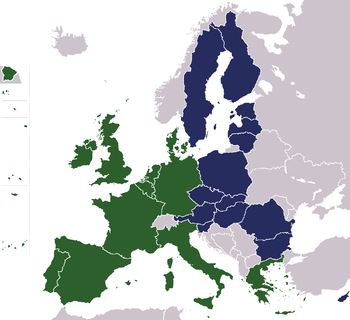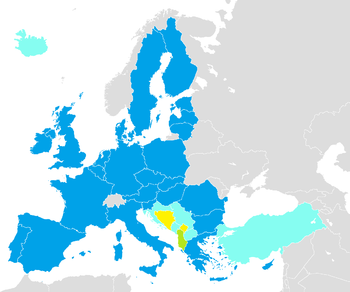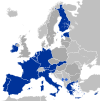- Copenhagen criteria
-
 Historical enlargement of the European Union under the Copenhagen criteria. Green: EU12 (1993). Blue: accessions of 1995, 2004 and 2007.
Historical enlargement of the European Union under the Copenhagen criteria. Green: EU12 (1993). Blue: accessions of 1995, 2004 and 2007. Possible future enlargement of the European Union:
Possible future enlargement of the European Union: Remainder of Former Yugoslavia within the Stabilisation and Association Process (Bosnia and Herzegovina and Kosovo[1])
Remainder of Former Yugoslavia within the Stabilisation and Association Process (Bosnia and Herzegovina and Kosovo[1])European Union 
This article is part of the series:
Politics and government of
the European UnionPolicies and issuesThe Copenhagen criteria are the rules that define whether a country is eligible to join the European Union. The criteria require that a state has the institutions to preserve democratic governance and human rights, has a functioning market economy, and accepts the obligations and intent of the EU. These membership criteria were laid down at the June 1993 European Council in Copenhagen, Denmark, from which they take their name. Excerpt from the Copenhagen Presidency conclusions[2]:
“ Membership requires that candidate country has achieved stability of institutions guaranteeing democracy, the rule of law, human rights, respect for and protection of minorities, the existence of a functioning market economy as well as the capacity to cope with competitive pressure and market forces within the Union. Membership presupposes the candidate's ability to take on the obligations of membership including adherence to the aims of political, economic and monetary union. ” Most of these elements have been clarified over the last decade by legislation of the European Council, the European Commission and the European Parliament, as well as by the case law of the European Court of Justice and the European Court of Human Rights. However, there are sometimes slightly conflicting interpretations in current member states—some examples of this are given below.
Contents
European Union membership criteria
During the negotiations with each candidate country, progress towards meeting the Copenhagen criteria is regularly monitored. On the basis of this, decisions are made as to whether and when a particular country should join, or what actions need to be taken before joining is possible.
The European Union Membership criteria are defined by the three documents:
- The 1992 Treaty of Maastricht (Article 49)
- The declaration of the June 1993 European Council in Copenhagen, i.e., Copenhagen criteria—describing the general policy in more details
- political
- economic
- legislative
- Framework for negotiations with a particular candidate state
- specific and detailed conditions
- statement stressing that the new member cannot take its place in the Union until it is considered that the EU itself has enough "absorption capacity" for this to happen.
When agreed in 1993, there was no mechanism for ensuring that any country which was already an EU member state was in compliance with these criteria. However, arrangements have now been put in place to police compliance with these criteria, following the "sanctions" imposed against the Austrian government of Wolfgang Schüssel in early 2000 by the other 14 Member States' governments. These arrangements came into effect on 1 February 2003 under the provisions of the Treaty of Nice.
Article 49 (formerly Article O) of the Treaty on European Union (TEU)[3] or Maastricht Treaty states that any European country that respects the principles of the EU may apply to join. Countries classification as European is "subject to political assessment"[4] by the Commission and more importantly—the European Council.
Although non-European states are not considered eligible to be members, they may enjoy varying degrees of integration with the EU, set out by international agreements. The general capacity of the community and the member states to conclude association agreements with third countries is being developed. Moreover, specific frameworks for integration with third countries are emerging—including most prominently the European Neighbourhood Policy (ENP). This notably replaces the Barcelona process which previously provided the framework for the EU's relations with its Mediterranean neighbours in Africa and the Middle East. The ENP should not be confused with the Stabilisation and Association Process in the Western Balkans or the European Economic Area. Russia does not fall within the scope of the ENP, but is subject to a separate framework. The European Neighbourhood Policy can be interpreted as the drawing up of the Union's borders for the foreseeable future. Another way the EU is integrating with neighbouring countries is through the Mediterranean Union, made up of EU countries and others bordering the mediterranean sea.
Political criteria
Democracy
Functional democratic governance requires that all citizens of the country should be able to participate, on an equal basis, in the political decision making at every single governing level, from local municipalities up to the highest, national, level. This also requires free elections with a secret ballot, the right to establish political parties without any hindrance from the state, fair and equal access to a free press, free trade union organisations, freedom of personal opinion, and executive powers restricted by laws and allowing free access to judges independent of the executive.
Rule of law
The rule of law implies that government authority may only be exercised in accordance with documented laws, which were adopted through an established procedure. The principle is intended to be a safeguard against arbitrary rulings in individual cases.
Human rights
Human rights are those rights which every person holds because of their quality as a human being; human rights are "inalienable" and belonging to all humans. If a right is inalienable, that means it cannot be bestowed, granted, limited, bartered away, or sold away (e.g. one cannot sell oneself into slavery). These include the right to life, the right to be prosecuted only according to the laws that are in existence at the time of the offence, the right to be free from slavery, and the right to be free from torture.
The United Nations Universal Declaration of Human Rights is considered the most authoritative formulation of human rights, although it lacks the more effective enforcement mechanism of the European Convention on Human Rights. The requirement to fall in line with this formulation forced several nations[citation needed] that recently joined the EU to implement major changes in their legislation, public services and judiciary. Many of the changes involved the treatment of ethnic and religious minorities, or removal of disparities of treatment between different political factions.
Respect for and protection of minorities
Members of such national minorities should be able to maintain their distinctive culture and practices, including their language (as far as not contrary to the human rights of other people, nor to democratic procedures and rule of law), without suffering any discrimination (see also the 'Convention for the Protection of National Minorities', COE, 1995).
A relevant Council of Europe convention was a major breakthrough in this field. However, the area was so sensitive that the convention did not yet include a clear definition of such minorities. As a result, many of the signatory states added official clarifications to their signature on which minorities in their country were involved. Some examples follow. Declarations made with respect to treaty No. 157. Framework Convention for the Protection of National Minorities include:
- in Denmark: the 'German minority in South Jutland';
- in Germany: 'Danes of German citizenship and the members of the Sorbian (Lusatia Sorbs) people with German citizenship....the ethnic groups traditionally resident in Germany, the Frisians of German citizenship and the Sinti and Roma of German citizenship';
- in Slovenia: 'Italian and Hungarian National Minorities'
- in Slovakia: 'Hungarian Minorities'
- in the United Kingdom Cornish minority in Cornwall and Irish Nationalists and Republicans in Northern Ireland.
- in Austria the Serbian, Croatian, Slovenian, Hungarian, Czech, Slovak, Roma, and Sinti groups.
- in Romania (Romania recognizes 19 national minorities - the electoral law guarantees them parliamentary representation)
- in Ireland: Irish Travellers.
Many other signatories simply stated that they do not have any national minorities as so defined.
A consensus was reached (among other legal experts, the so-called groups of Venice) that this convention refers to any ethnic, linguistic or religious people that defines itself as a distinctive group, that forms the historic population or a significant historic and current minority in a well-defined area, and that maintains stable and friendly relations with the state in which it lives. Some experts and countries wanted to go further. Nevertheless, recent minorities, such as immigrant populations, have nowhere been listed by signatory countries as minorities concerned by this convention.
Economic criteria
The economic criteria, broadly speaking, require that candidate countries have a functioning market economy and that their producers have the capability to cope with competitive pressure and market forces within the Union. The Euro convergence criteria and European Exchange Rate Mechanism has been used to prepare countries for joining the Eurozone, both founding and later members.
Legislative alignment
Finally, and technically outside the Copenhagen criteria, comes the further requirement that all prospective members must enact legislation in order to bring their laws into line with the body of European law built up over the history of the Union, known as the acquis communautaire. In preparing for each admission, the acquis is divided into separate chapters, each dealing with different policy areas. For the process of the fifth enlargement that concluded with the admission of Bulgaria and Romania in 2007, there were 31 chapters. For the talks with Croatia, Turkey and Iceland the acquis has been split further into 35 chapters.
References
- ^ Under United Nations Security Council Resolution 1244; status disputed, See International recognition of Kosovo for details.
- ^ Presidency Conclusions, Copenhagen European Council 1993, 7.A.iii http://www.europarl.europa.eu/enlargement/ec/pdf/cop_en.pdf
- ^ "The Maastricht Treaty" (PDF). Treaty on the European Union. eurotreaties.com. 1992-02-07. http://www.eurotreaties.com/maastrichteu.pdf. Retrieved 2008-07-09.
- ^ "Legal questions of enlargement". Enlargement of the European Union. The European Parliament. 1998-05-19. http://www.europarl.europa.eu/enlargement/briefings/23a2_en.htm. Retrieved 2008-07-09.
External links
Categories:- Enlargement of the European Union
- 1993 in the European Union
Wikimedia Foundation. 2010.







